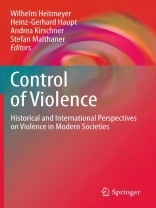The Control of Violence in Modern Society, starts from the hypothesis that in modern society we will face an increasing loss of control over certain phenomena of violence. This leads to unpredictable escalations and violence can no longer be contained adequately by the relevant control regimes, such as police, state surveillance institutions, national repression apparatuses and international law. However, before investigating this hypothesis from an internationally and historically comparative perspective, the terms and ‚tools‘ for this undertaking have to be rendered more precisely. Since both ‚control‘ and ‚violence‘ are all but clear-cut terms but rather highly debatable and contested concepts that may take multiple connotations. The main question is whether an increase in certain forms of violence can be explained by the failure or, in turn, ‚overeffectiveness‘ of certain control mechanisms. It is asked, for instance, which contribution religion can make to limit violence and, in turn, which destructive potential religion might have in its fundamentalist form. Moreover, the concept of individual self-control as well as social institutions and strategies of collective disengagement and de-radicalization are investigated with regard to their potential for controlling violence.
The Control of Violence in Modern Society concludes with a re-examination of the hypothesis of a loss of control by specifying in what cases and under which circumstances we can speak of a loss of control over violence.
Inhaltsverzeichnis
1. Theoretical and analytical framework
2. Control and loss of control in an historical perspective
Policining youth protests and juvenile delinquency in Germany from the 1950s until 1980s
Anarchist terrorism in imperial Germany and third Republic France
Deescalation by Communication? Dealing with Left-Wing Terrorism in the 1970s and 1980s
Ethnic riots in situations of loss of control: regime change, civil war and revolution as opportunity structures for anti-Jewish violence in 19-20th century Europe
Control of violence by gun-control. Concepts and activities in the German Empire 1871 – 1914
Loss of Control over Small-Group Clandestine Violence: The Case of German Terrorism in the Long Twentieth-Century
Making war and crafting peace in contemporary Africa
The neglected significance of skill formation in control of violence
Violence control beyond the state? The case of DR Congo
‚You can’t be donated power‘: Altruistic Intervention, Political Violence, and Post-War Reconstruction – the role of ‘external’ actors in the control of violence
3. Multidisciplinary perspectives on violence
Nature of Violence
The modernity of violence: decivilizing processes
Giving an end to violence
Emerging evidence for the theory of low-status compensation and its relationship to violence
4. The Micro-Level: School-Shootings
School Shootings: Perceived losses of control – attempts to regain control
School violence and its control in the USA and Germany since the 1950s
School shootings: Specific problems of control
Prevention, Intervention and Coping with School Shootings (reprint)
5. The Meso-Level: Terrorism
Local roots and transnationalism of ‘Islamist’terrorism
Out of control? Explaining terrorist violence from a Jihadi perspective
Transformations of terrorism. The performative character of political violence.
The radical milieu: pathways to joining terrorist groups
The Grotesque Body and Mystical Conquest: The Case of Shi‘i Cult of Martyrdom
6. The Macro Level: Violence in fragile states
Modern Barbarism and the propects of civilization. Eliasion themes in an African context
Controlling violence in the failed state: An examination of the UN’s disarmament, demobilization and reintegration
Using fuel to put out a fire? Violence control in the context of ‘fragile’ states – the case of vigilantism in Nigeria
Oil in the Niger Delta – militancy and the challenge of violence control
Climate change and conflict
7. Mechanisms and ‚tools‘ of control
8. Case studies on the mechanism of control
Religions actors and their potential of containing violence
Impact of religion on prevention and control of violence
Religious communities as violent actors
Self-Control and the Management of Violence
Conscience as an element of self-control
Opportunities for de-radicalizing radical milieus
Learning terrorism behind individual and collective disengagement
Violence, control and the body
Cross-National Homicide Trends in the Latter Decades of the 20th Century: Losses and Gains in Institutional Control?
9. Conclusion
Loss of control? In what cases and under what circumstances.
Über den Autor
Wilhelm Heitmeyer (Dr. phil.) is Professor of Socialization and Director of the Institute for Interdisciplinary Research on Conflict and Violence at Bielefeld University. His research interests concentrate on violence, social disintegration, right-wing extremism, and ethnic-cultural conflicts. His publications include
International Handbook of Violence Research (co-edited with John Hagan);
Rechtsextremistische Orientierungen bei Jugendlichen [
Right-Wing Extremism Among Young People] (1987);
Gewalt [
Violence] (1995);
Bedrohte Stadtgesellschaften [
Urban Societies Under Threat] (co-edited with Reimund Anhut) (2000). He is Editor-in Chief of the
International Journal of Conflict and Violence (with D. Massey et al.). He is organizer of the international research group ‚Control of Violence‘ at the Center for Interdisciplinary Research (Zi F), Bielefeld University (with Heinz Gerhard-Haupt/ Bielefeld, Florence). Heinz-Gerhard Haupt (Dr. phil.) is Professor of Social History at Bielefeld University and Head of the department of history and civilization at the European University Institute in Florence, Italy. His work focuses on social History and political History of Modern Europe, Methodology of Comparative History. His current research projects encompass History of Political Violence in 19th and 20th Century Europe, History of Consumption in 19th and 20th Century Europe, History of Social Movements and Classes: The First of May in Europe after 1945, Comparative History of European Nationalism: Nation and Religion in 19th and 20th Century. Recent publications include
Neue Politikgeschichte [
New political history](with Ute Frevert, eds.) (2005);
Exklusion und Partizipation [
Exclusion and particpiation] (with C. Gusy, Eds.);
Terrorismus in der Bundesrepublik:
Medien, Staat und Subkulturen in den 1970er Jahren [
Terrorism in the Federal Republic of Germany: Media, state, and subcultures] (with K. Weinhauer and J. Requate, Eds.) (2006). He is organizer of the international research group ‚Control of Violence‘ at the Center for Interdisciplinary Research (Zi F), Bielefeld University (with Wilhelm Heitmeyer/ Bielefeld).












